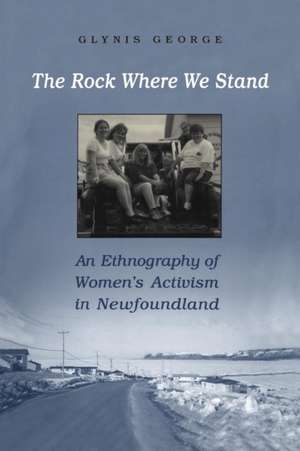George, G: The Rock Where We Stand: Anthropological Horizons
Autor Glynis R. Georgeen Limba Engleză Paperback – 31 aug 2000
Bay St. George in western Newfoundland is a region characterized by a boom and bust economy and shaped by the establishment of the Earnest Harmon American Airforce Base. This ethnography explores how women at the Bay St. George Women's Council deal specifically with the issues of single motherhood, child sexual abuse, and domestic violence, and examines the interplay of feminist and Newfoundland identification among these individuals.
Drawing on 14 months of participant observation and interviews with women at the Council, George provides a much needed, specifically Canadian contribution to ethno-cultural studies, grass-roots activism, and feminist studies. The research successfully situates the particular concerns and political activism of these women in this rural region of Canada within the larger context of economic restructuring and neoliberal economic and social policies that continue to marginalize women in Canada and around the world.
This important study continues the work of feminist ethnographies by such scholars as: Abu-Lughod, Behar, Cole, DiLeonardo, Ginsburg, and Lowenhaupt-Tsing. Avoiding the all too common pitfall of folkorization in rural studies, The Rock Where We Stand represents an innovative and experimental contribution to the field.
Din seria Anthropological Horizons
-
 Preț: 216.80 lei
Preț: 216.80 lei - 41%
 Preț: 131.16 lei
Preț: 131.16 lei -
 Preț: 186.75 lei
Preț: 186.75 lei -
 Preț: 171.09 lei
Preț: 171.09 lei - 34%
 Preț: 163.67 lei
Preț: 163.67 lei -
 Preț: 398.58 lei
Preț: 398.58 lei -
 Preț: 228.50 lei
Preț: 228.50 lei -
 Preț: 372.45 lei
Preț: 372.45 lei -
 Preț: 264.26 lei
Preț: 264.26 lei -
 Preț: 225.13 lei
Preț: 225.13 lei -
 Preț: 364.46 lei
Preț: 364.46 lei -
 Preț: 309.61 lei
Preț: 309.61 lei -
 Preț: 406.81 lei
Preț: 406.81 lei -
 Preț: 320.74 lei
Preț: 320.74 lei -
 Preț: 355.53 lei
Preț: 355.53 lei -
 Preț: 293.54 lei
Preț: 293.54 lei -
 Preț: 236.48 lei
Preț: 236.48 lei -
 Preț: 202.19 lei
Preț: 202.19 lei -
 Preț: 387.33 lei
Preț: 387.33 lei - 19%
 Preț: 641.03 lei
Preț: 641.03 lei -
 Preț: 347.55 lei
Preț: 347.55 lei -
 Preț: 375.97 lei
Preț: 375.97 lei -
 Preț: 328.73 lei
Preț: 328.73 lei -
 Preț: 291.57 lei
Preț: 291.57 lei -
 Preț: 296.42 lei
Preț: 296.42 lei -
 Preț: 298.70 lei
Preț: 298.70 lei -
 Preț: 446.17 lei
Preț: 446.17 lei - 19%
 Preț: 507.92 lei
Preț: 507.92 lei -
 Preț: 358.05 lei
Preț: 358.05 lei -
 Preț: 454.65 lei
Preț: 454.65 lei -
 Preț: 376.91 lei
Preț: 376.91 lei - 26%
 Preț: 355.69 lei
Preț: 355.69 lei - 17%
 Preț: 245.88 lei
Preț: 245.88 lei - 19%
 Preț: 149.82 lei
Preț: 149.82 lei - 8%
 Preț: 335.24 lei
Preț: 335.24 lei - 23%
 Preț: 164.88 lei
Preț: 164.88 lei - 27%
 Preț: 397.25 lei
Preț: 397.25 lei
Preț: 372.15 lei
Nou
71.21€ • 74.54$ • 59.27£
Carte tipărită la comandă
Livrare economică 31 martie-14 aprilie
Specificații
ISBN-10: 080208317X
Pagini: 240
Ilustrații: 3 maps
Dimensiuni: 151 x 229 x 22 mm
Greutate: 0.4 kg
Editura: University of Toronto Press (Scholarly Pub)
Seria Anthropological Horizons














